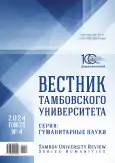The British Digital Press Archive as a source on the history of the collective memory of the First World War participants in the interwar period
- Authors: Inkin V.V.1
-
Affiliations:
- Derzhavin Tambov State University
- Issue: Vol 29, No 4 (2024)
- Pages: 1133-1145
- Section: FOREIGN COUNTRIES’ HISTORY
- URL: https://bakhtiniada.ru/1810-0201/article/view/297804
- DOI: https://doi.org/10.20310/1810-0201-2024-29-4-1133-1145
- ID: 297804
Cite item
Full Text
Abstract
Importance. The 110th anniversary of the First World War outbreak awakens in the public and scientific community not only discussions about the causes of the conflict, but also forces us to turn to the legacy of this process. In this regard, the work actualizes the theme of historical memory of the “Great War”. The purpose of the study is to reflect the complex of the legacy of the First World War in Great Britain in the 1930s by referring to the British Newspaper Archive.Materials and Methods. For the analysis of historical memory in the Great Britain, memoirs, monumental art, works of cinema, music, and many others are often involved. Methods of working with the British newspaper Archive are considered and, based on a specific historical method, we will reflect the perception of the First World War in British society and the situation of veterans in the 1930s. The method of quantitative content analysis is used. The necessary database of source material is selected by keywords, then the selected sources are grouped according to a certain topic. Memoirs, monumental art, works of cinema, music and much more are often used to analyze historical memory in Great Britain. In this work, we will look at the techniques of working with the British Newspaper Archive and, based on a specific historical method, reflect the perception of the First World War in British society and the situation of veterans in the 1930s. Due to the free access to a huge mass of English-language sources, this digital archive is of interest to researchers. The work uses the method of quantitative content analysis.Results and Discussion. During the study of press materials, it can be stated that the following agenda has been identified in the historical memory and legacy of the First World War in Great Britain in the 1930s: 1) the presence of narratives reflecting the pride of British society for the heroism of soldiers and sorrow for the many sacrifices they made in the name of victory in the war; 2) despite the discussions’ existence about the frontline brotherhood during the war period, after the war, veterans rallied into unions and organizations engaged in a wide variety of support (from mediation when applying for a job to appeals to the authorities about pension provision).Conclusion. Thus, despite the apparent immensity of the digital database of the British Newspaper Archive, the application of the well-known methodological principle of “Occam’s razor” makes it possible to compile a corpus of sources that meet the purpose of the study. Immersion in the press materials themselves allows the researcher to immerse himself more in the socio-cultural context of Great Britain in the 1930s. Due to the complexity of the information from the studied sources.
About the authors
V. V. Inkin
Derzhavin Tambov State University
Author for correspondence.
Email: vic-ink@yandex.ru
ORCID iD: 0009-0001-6840-9158
Research Scholar of History of History and Philosophy Department
Russian Federation, 33 Internatsionalnaya St., Tambov, 392000, Russian FederationReferences
- Hochschild A. (2014). Der Große Krieg: Der Untergang des alten Europa im Ersten Weltkrieg 1914–1918. Bonn, Bpb Publ., 525 S. (In Ger.)
- Airapetov A.G., Belousov L.S., Dazhina V.D. et al. (2014). The First World War and the Destiny of European Civilization. Moscow, Lomonosov Moscow State University Publishing House, 815 p. (In Russ.) https://elibrary.ru/tmowrz
- Sych A.I. (2001). On some socio-psychological consequences of the First World War (1914–1918). Voprosy Istorii, no. 11-12, pp. 109-113. (In Russ.)
- Liburd L.J. (2018). Beyond the pale: whiteness, masculinity and Empire in the British Union of Fascists, 1932–1940. Fascism, no. 7 (2), pp. 275-296. https://doi.org/10.1163/22116257-00702006
- Ferguson N. (1999). The pity of war: explaining World War I. New York, Basic Book Publ., 563 p.
- Connelly M. (2002). The Great War, Memory and Ritual: Commemoration in the City and East London, 1916–1939. Woodbridge, Boydell & Brewer Publ., Royal Historical Society Publ., 271 p. https://doi.org/10.2307/j.ctv136bvr4
- Ul’yanov P.V. (2022). Monuments of the First World War in London and their cultural and historical significance for the formation of the image of the region. Altaiskaya shkola politicheskikh issledovanii, no. 38,
- pp. 88-95. (In Russ.) https://elibrary.ru/yiquox
- Smirnova T.A. (2011). Monuments, mnemonic sites and construction of collective memory about the First World War in England. Yaroslavskii pedagogicheskii vestnik = Yaroslavl Pedagogical Bulletin, vol. 1,
- no. 4, pp. 98-101. (In Russ.) https://elibrary.ru/piwugn
- Smirnova T.A. (2014). Researching features of historical memory and practices of commemoration of the First World War in Britain in 1918–1939. Yaroslavskii pedagogicheskii vestnik = Yaroslavl Pedagogical Bulletin, vol. 1, no. 4, pp. 95-98. (In Russ.) https://elibrary.ru/tfxqpb
- Nikolai F.V. (2018). Memory of the First World War in contemporary English historiography: between experience and narrative. Vestnik Nizhegorodskogo universiteta im. N.I. Lobachevskogo = Vestnik of Lobachevsky University of Nizhni Novgorod, no. 4, pp. 68-71. (In Russ.) https://elibrary.ru/xzilgx
- Romanova E.V. (2019). Evolution of British perceptions of World War I. Perspektivy. Elektronnyi zhurnal = Perspectives and Prospects. E-journal, no. 1 (17), pp. 92-103. (In Russ.) https://doi.org/10.32726/2411-3417-2019-1-92-103, https://elibrary.ru/adjdgy
- Uinter D. (2023). Sites of memory, sites of mourning: the Great War in European cultural history. St. Petersburg, European University in St. Petersburg Publ., 392 p. (In Russ.)
- Uinter D. (2016). War, memory, remembrance. Dialog so vremenem = Dialogue with Time, no. 56, pp. 5-15. (In Russ.) https://elibrary.ru/wmfqdb
- Bisk I.Ya. (1995). Pressa Veimarskoi Germanii. Ivanovo, Ivanovo State University Publ., 231 p. (In Russ.)
- Hastings M. (2013). Catastrophe: Europe Goes to War 1914. London, Knopf Press, 628 p.
- Beckett I.F.M. (1987). Discovering English County Regiments. Princes Risborough, Shire, 160 p.
Supplementary files








